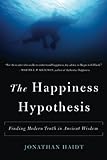Happiness is a funny thing, because you can't just keep going straight. Doing only things you like (or things you're good at) isn't a recipe for long-term happiness. Both lottery winners and victims of horrific accidents revert to an average happiness over the long term.
You can read more. This book[1] by my college Psychology professor is the first that came to mind:
[1] https://www.amazon.com/Happiness-Hypothesis-Finding-Modern-A...
Yes Man ( http://www.amazon.com/Yes-Man-Danny-Wallace/dp/1416918345 )
This book made me realize that I was defaulting to "no" in many aspects of my life. After this book I changed many things in my life, and ended up meeting and dating my future (now present) wife. Overall my life has been much improved by defaulting to "yes".
The Pleasures and Sorrows of Work ( http://www.amazon.com/Pleasures-Sorrows-Work-Alain-Botton/dp... )
Gave me insight into how there is a huge invisible fabric of society that we take for granted, and how I consistently underrated many categories of jobs. One change I made after reading this book is to respect the jobs that I took for granted, like the clerk at the checkout counter. I now give attention and respect to people that I used to treat like furniture before.
Books that would have changed my life had I read them sooner (and not have to learn their lessons the long/hard way.)
The Happiness Hypothesis ( http://www.amazon.com/Happiness-Hypothesis-Finding-Modern-An... )
The notion this book puts forward of the subconscious as a powerful but stubborn elephant and the conscious as its well-meaning but often impotent handler provides much insight into why people act against their own interests, and why they tell lies about themselves and their own actions. One of the things I had realized beforehand (through many years of struggling with social interaction) that the book also covers is how we all tell a story of our life in which we are the hero, and how we rationalize our actions to fit the story instead of adapting the story to fit the facts.
Peopleware ( http://www.amazon.com/Peopleware-Productive-Projects-Teams-S... )
The book covers why building software is primarily a people problem, not a technical problem. Again, I had already realized this, but it would have been nice to learn it sooner. Some stuff is outdated, but it's still one of the top books on building software in my opinion.
I'm more sympathetic to this type of argument after reading Jonathan Haidt's book: http://www.amazon.com/Happiness-Hypothesis-Finding-Modern-An...
http://www.amazon.com/Happiness-Hypothesis-Finding-Modern-An...


(Though the rider can, slowly over time, train the elephant in certain things. But that's not in-the-moment control.)
IIRC - it's been a while since I read it - part of the book's point is that the whole system of elephant + rider is "us", even though the conscious POV is just the rider.
https://www.amazon.com/Happiness-Hypothesis-Finding-Modern-A...